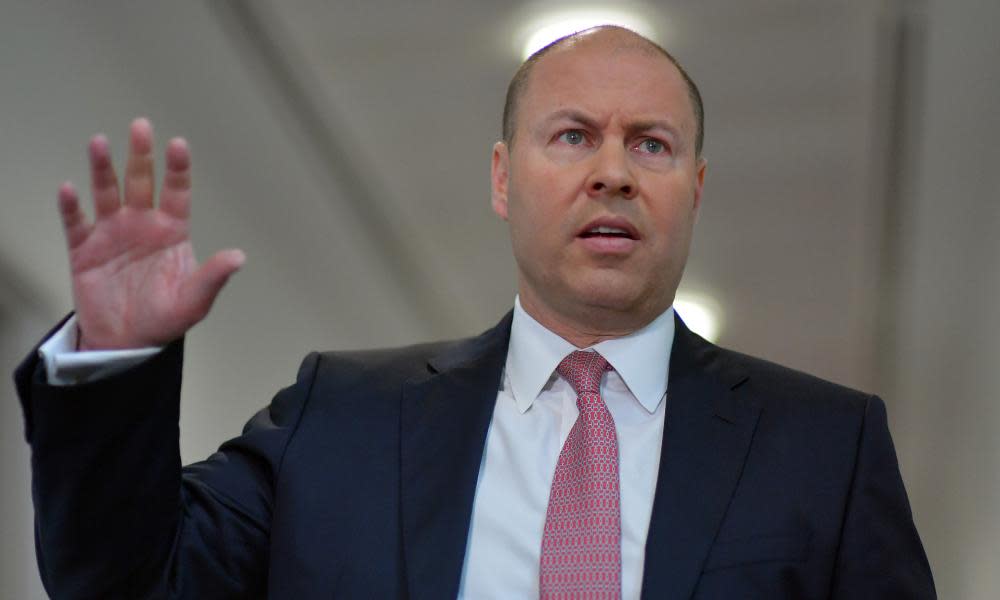Coalition leaves largest underperforming funds out of super reform laws

Trustees of super funds run only for the profit of members have raised concerns the largest retirement income sector has been left out of new laws designed to get rid of Australia’s worst super funds.
As part of the budget, the treasurer, Josh Frydenberg, promised to introduce laws measuring the performance of super funds and barring those with persistently sub-par returns from accepting new members.
However, draft legislation released by Treasury last month mandates performance tests only for the $730bn contained in low-fee MySuper funds, and ignores the $1.3tn contained in more complex “choice” products.
In 2018 the Productivity Commission found that more than a third of choice options underperformed. Almost all the underperforming choice funds it looked at were offered by players such as banks that operate funds for profit.
Related: Industry super funds say new laws could prevent consumers escaping 'crap' for-profit funds
It recommended the performance of all funds be regularly assessed and chronic underperformers forced to merge or be wound up.
The chief executive of the Australian Institute of Superannuation Trustees, Eva Scheerlink, said Frydenberg’s proposed legislation took “a much softer approach” than the one recommended by the commission.
“Underperforming choice products – examples of which stunned the community during the banking royal commission – escape scrutiny completely in the legislation,” she said.
“Unlike the Productivity Commission, the proposed laws keep all underperforming funds in the system and simply prevent underperforming MySuper funds taking new members. This will, unfortunately, only make the situation worse for existing members of those funds.”
The AIST represents the trustees of industry funds, which have been targeted by government backbenchers including Andrew Bragg, a former director of policy at for-profit sector lobby group the Financial Services Council, and now a senator for New South Wales.
It also represents the trustees of funds that direct all profits to members, including ones run by governments, companies and churches for the benefit of staff.
A spokeswoman for the assistant minister for superannuation, Jane Hume, said the government was starting with MySuper products because they have the highest level of disengaged members.
“We are not prepared to wait to do it all at once – there are voices saying the real motivation behind this is to have nothing happen for as long as possible which we won’t accept as members deserve better,” she said.
“Delaying these tests withholds delivering benefits to members and allows underperforming funds to continue to hide.”
On budget night in October, Frydenberg referred generically to “superannuation funds” when announcing the proposed crackdown.
“Superannuation funds will be required to meet an annual performance test under the guidance of the prudential regulator,” he said.
“Poor performing funds will have nowhere to hide and will be required to notify their members of their underperformance.”
Tests for products other than MySuper can be added later through regulations written by the treasurer, but industry players are concerned that the government’s promises are vague and are worried about the prospect of lengthy delays.
The government has promised to test what it calls “trustee-directed products” from 1 July 2022, but the term isn’t defined in the draft legislation and many in the industry are unclear as to what it means.
Related: New super rules: how Coalition changes will wrap industry funds in red tape
On some estimates, about 80% of choice products would not qualify as trustee-directed products.
The definition appears to exclude products such as an AMP cash fund that delivered negative returns to members, which was excoriated during banking royal commission hearings.
Hume’s spokeswoman said trustee-directed products were “closely comparable to MySuper products and the performance test is readily applicable to them”.
“Over time, the government has indicated that other Apra-regulated investment options will also be subjected to annual performance tests,” she said.
There are also concerns that regulations bringing choice funds under the testing umbrella may be a long time coming.
The government is yet to make regulations detailing how choice funds should provide a “product dashboard” – a readout of the fund’s financial performance designed to be easy for members to digest – even though legislation mandating such dashboards was passed in 2013.
MySuper products have been required to have such a dashboard since December 2013, but the start date for choice products has been repeatedly pushed back due to the lack of regulations.
Last year, the Australian Securities and Investments Commission pushed the start date back to 2023 – a full decade after the dashboard requirement became law.
“This will allow further consideration by government of the policy position,” Asic said at the time.
“Asic will adjust or revoke the relief once policy positions in relation to dashboards are settled.”

 Yahoo News
Yahoo News 
